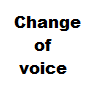All
about pronoun/Types of Noun
1.
Personal Pronouns
2. Possessive Pronouns
3. Demonstrative Pronouns
4. Reflective and Emphasising Pronouns
5. Relative Pronouns
6. Interrogative Pronouns
7. Distributive Pronouns
8. Indefinite Pronouns
9. Reciprocal Pronouns
a). First person:
As: I, me, my, we, myself, ourselves etc---1st Person
b). Second person:
As: you, yourself, thou, thyself etc---2nd Person
c). Third person:
As: He, she, it, they, himself,
herself, itself, all except 1st & 2nd persons are 3rd person ---3rd Person
A Pronoun that stands for First,Second or Third person is called a Personal
Pronoun.
As: I am a student.
We are going to school.
You are a boy.
He is a doctor.
She is a nurse.
It is a good ring.
They are
students.
2. Possessive Pronouns
3. Demonstrative Pronouns
4. Reflective and Emphasising Pronouns
5. Relative Pronouns
6. Interrogative Pronouns
7. Distributive Pronouns
8. Indefinite Pronouns
9. Reciprocal Pronouns
a). First person:
As: I, me, my, we, myself, ourselves etc---1st Person
b). Second person:
As: you, yourself, thou, thyself etc---2nd Person
c). Third person:
A Pronoun that stands for First,Second or Third person is called a Personal Pronoun.
As: I am a student.
We are going to school.
You are a boy.
He is a doctor.
She is a nurse.
It is a good ring.
They are students.
|
Person
|
Singular
|
Plural
|
|
First
|
My,
mine, my own
|
Our,
ours, our own
|
|
Second
|
Thy,
thine, thy own
|
Your,
yours, your own
|
|
Third
|
His,
his own
Her
, hers, her own
Its,
its own
|
Their,
theirs, their own
|
3.
Demonstrative Pronouns
As: That is a rat.
These are books.
This is a car.
The noun which is demonstrated by this pronoun is called Antecedent.
This/these denotes near
That/those denotes far
4.
Reflective and Emphasising Pronouns:
I have hurt myself.
Here subject and object are same person
A Emphatic pronoun is used to
emphasize the subject-Nesfield
5.
Relative Pronouns:
I know the boy who went there.
6.
Interrogative Pronouns:
Interrogative pronoun has different forms for Nominative, Genitive
and Accusative cases.
Nominative:
Who
What and which do not have different forms for different cases.
7.
Distributive Pronouns:
Each of the girls got a gift.
Either
and Neither denote single person or thing, so there will
be singular verb after these.
One should respect one’s superiors.
None, One, Some, Any, Many, It, They etc do not signify any person or
thing.
9.
Reciprocal Pronouns:
The two boys help each other.
For two persons: each other
As: That is a rat.
These are books.
This is a car.
The noun which is demonstrated by this pronoun is called Antecedent.
This/these denotes near
That/those denotes far








0 Comments
Thank you for your comment.